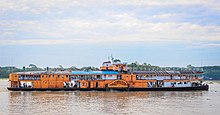Bangladesh Inland Water Transport Corporation
| Formation | 1972 |
|---|---|
| Headquarters | Dhaka, Bangladesh |
Region served | Bangladesh |
Official language | Bengali |
| Website | www |
The Bangladesh Inland Water Transport Corporation (abbr. BIWTC, Bengali: বাংলাদেশ অভ্যন্তরীণ নৌ-পরিবহন কর্পোরেশন),[1] is a government-owned company that owns and operates inland vessels and ports in Bangladesh, headquartered in Dhaka.[2][3]

The organisation gains the majority of its revenue by operating ferry services. It also offers coastal passenger services, container and cargo services, ship repair and breaking services.[4]
| Part of a series on |
| Transport in Bangladesh |
|---|
 |
| Modes |
| Aviation |
| Authorities |
|
| Public transits |
| Important infrastructures |
| Others |
History

The Bangladesh Inland Water Transport Corporation was founded in 1972 after the Liberation of Bangladesh. It was placed in charge through the nationalisation of the East Pakistan Shipping Corporation and other private shipping corporations.[2][5]
Paddle steamers
The company operated around 13 passenger-and-cargo paddle steamers in 1972,[6] nicknamed “the Rockets” for their speed.[7] These included PS Sandra, PS Lali, PS Mohammed, PS Gazi, PS Kiwi, PS Ostrich, PS Mahsud, PS Lepcha, and PS Tern.[6] The steamers served destinations such as Chandpur, Barisal, Khulna, Morrelganj, and Kolkata, from Dhaka.[8]
In the 1980s, the steam engines were replaced with diesel ones, and the wooden paddles were replaced with iron ones.[9] Hydraulic steering was introduced in the 1990s, followed by electro-hydraulic systems in 2020.[6] Modern equipment such as radar and GPS was also installed.[9] However, PS Gazi, PS Teal, and PS Kiwi were decommissioned in the late '90s after catching fire while docked for repairs.[10]
Until 2022, four paddle steamers—PS Ostrich (built in Scotland in 1929),[7] PS Mahsud (1928), PS Lepcha (1938), and PS Tern (1950)—were operated by the BIWTC once a week. This was a reduction from daily trips,[6] and commercial services were eventually stopped altogether due to safety concerns, operational losses, and a lack of passengers, especially following the inauguration of the Padma Bridge.[11][6][4]
Fleet and service
As of 2024, the BIWTC has a total of 119 vessels, including 59 ferries, 20 passenger vessels, 16 coastal vessels, nine tugboats, and 15 cargo and container ships.[12]
Passenger vessels
Although passenger services are not in operation as of 2024,[4] the corporation has five historic paddle steamers in its passenger ferry fleet: the PS Ostrich (1929), PS Mahsud (1928), PS Lepcha (1938), PS Tern (1950), and the MV Shela (1951).[13] The company commissioned the modern MV Madhumoti (2015) and the MV Bangali (2014) passenger ferries for the first time in six decades, each 76 metres (249 ft) long and capable of carrying 750 passengers, from Western Marine Shipyard.[14]
Roll-on/roll-off ferries
BIWTC runs roll-on/roll-off ferry services for vehicles on seven routes, bridging destinations inaccessible directly by road:[15]
| From | To | Distance |
|---|---|---|
| Paturia | Daulatdia | 3 km (1.9 mi) |
| Aricha | Kazirhat | 14 km (8.7 mi) |
| Raomari | Chilmari | 28.5 km (17.7 mi) |
| Dawapara | Nazirganj | 6 km (3.7 mi) |
| Chandpur | Shariatpur | 10 km (6.2 mi) |
| Bhola | Lakshmipur | 28 km (17 mi) |
| Laharhat | Vadutia | 10 km (6.2 mi) |
References
- ^ "BIWTC starts special Eid services today". Daily Sun. Retrieved 23 November 2016.
- ^ a b Dowlah, Caf (19 October 2016). The Bangladesh Liberation War, the Sheikh Mujib Regime, and Contemporary Controversies. Lexington Books. p. 95. ISBN 9781498534192. Retrieved 23 November 2016.
- ^ "Poor navigability disrupts Mawa ferry service". Dhaka Tribune. 18 September 2013. Retrieved 6 June 2024.
- ^ a b c Shaon, Ashif Islam (10 February 2024). "BIWTC plans to resume inland passenger service soon". The Business Post. Retrieved 6 June 2024.
- ^ "Bangladesh Inland Water Transport Corporation Order, 1972 (President's Order No. 28 of 1972)". bdlaws.minlaw.gov.bd. Retrieved 23 November 2016.
- ^ a b c d e Mithu, Ariful Islam (24 January 2024). "The last vestige of paddle steamers: A new tourist attraction on the horizon?". The Business Standard. Retrieved 6 June 2024.
- ^ a b MacEacheran, Mike (25 February 2022). "A romantic window into a half-drowned world". BBC. Retrieved 6 June 2024.
- ^ Nandy, Dipan (13 December 2023). "Gone are the days of paddle steamers". The Daily Star. Retrieved 6 June 2024.
- ^ a b Shafique, Saleh (20 May 2022). "The last water rockets". The Business Standard. Retrieved 6 June 2024.
- ^ Parveen, Shahnaz (1 December 2010). "'Rockets' running out of steam". The Daily Star. Retrieved 6 June 2024.
- ^ Shwapan, Anisur Rahman (14 January 2023). "Rocket-steamer service: 150-year-old tradition abandoned due to loss". Dhaka Tribune. Retrieved 6 June 2024.
- ^ Shaon, Ashif Islam (15 May 2024). "BIWTC struggles to find a way out". The Business Post. Retrieved 6 June 2024.
- ^ Tahmid, Nafiz (9 April 2022). "100 Years of Rocket Paddle Steamer: A Pride and Heritage of Bangladesh". United News of Bangladesh. Retrieved 6 June 2024.
- ^ Hasan, Jubair (19 May 2018). "New vessels now albatross around BIWTC's neck". The Financial Express. Retrieved 6 June 2024.
- ^ "Ferry Terminal". Bangladesh National Portal. Bangladesh Inland Water Transport Corporation. Retrieved 12 June 2024.
